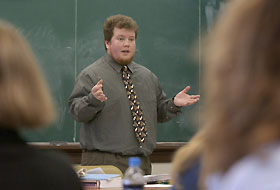|
This is an archived article.
For the latest news, go to the Advance Homepage
For more archives, go to the Advance Archive/Search Page. |
||
|
Philosophy TA Helps Students
"If you can 'light that little spark' in students, they'll be eager to learn," says Adam Potthast. "And the most effective learner is a student who is genuinely interested in the subject matter." Potthast, a teaching assistant in the philosophy department, received the 2003 Outstanding Teaching Assistant Award from the University. He says 'lighting a spark' isn't necessarily easy.
"In the past, philosophy teachers could often rely on pure fascination about philosophical questions to generate the kind of interest I'm describing," he says. "While this still appeals to many students, more and more come to a university valuing practical concerns over fascinating mysteries." So how does he teach a subject that many students fear will be too abstract to understand? "You have to make it practical," Potthast says. "So I teach it mostly as a skills course - how to think in an ordered, clear way." He says philosophy involves two basic skills: "Finding reasons for one's beliefs or opinions, and learning to evaluate and weigh those reasons against others that are on offer. If I can give my students a strong grounding in these two skills, they'll find that all their academic pursuits will become easier and more enjoyable." He tells his students that this ordered way of thinking is "basic to almost anything they'll ever study. So they can take practical lessons from philosophy and apply it everywhere. That's why I love to teach it." Potthast requires students to use online message boards to engage in conversation with their peers about the course material. "It brings some of the more quiet students out of their shells," he says. He also abides by a policy he calls 'full disclosure.' "The point of this policy is to assure my students that they do not have to guess about what they're required to know, or how they're doing in the class," he says. All essay or short-answer questions that have a chance of being asked on any exam are given to them ahead of time. Recalling something he learned from Keith Barker, director of UConn's Institute for Teaching and Learning, Potthast says, "You should always tell students what it is they need to know, otherwise it's not education, it's the lottery." Potthast, who is from St. Louis, earned a bachelor's degree in philosophy and English from Truman State University in Missouri in 1998, and a master's degree in philosophy from UConn in 2000. He is working on his doctorate at UConn and plans to graduate in 2005. Jessica Kulielka, a fourth-semester undergraduate who was in Potthast's Honors Philosophy 101 class last semester, says he has "tremendous skill in demonstrating the importance and relevance of philosophy in an academic or real-life situation." "He immediately sparked my curiosity," she says. "He made lectures fun and stimulated classroom participation more than any other course professor I had yet known." Another student, Jonas TePaske, says, "I was lucky enough to have him for Honors Philosophy 101. His teaching style was one that brought about a stimulating reciprocal environment, in which the students felt that they could challenge him as much as he challenged us." TePaske says he appreciated Potthast's accessibility, adding that he "spent a great deal of time discussing numerous topics" during the TA's office hours. "Some people say it was inevitable that I became interested in philosophy," Potthast says, "because my mother was a former nun and my father was a former priest. My parents met while teaching at a high school in Illinois, and they realized that their true callings were to be together and have a family." Their marriage produced two sons and much "abstract conversation around the dinner table about goodness and religion," Potthast says. Potthast says he enjoys using humor in his classes. "I always liked the professors who told jokes, so I try to imitate them," he says. Philosophy professor Joel Kupperman says he's not surprised that Potthast won a teaching award. "He is patient, and willing to take the time to get something clear," says Kupperman, Potthast's major advisor. "He is a thoroughly decent person, and students do respond to that. He also has broad interests, rather than having a narrow 'ultra-professional' attitude toward his subject. This enables him to appreciate the point of view of someone who is coming to philosophical problems for the first time." Potthast says it's rewarding to teach philosophy because "the discipline goes on, and I love the discipline. I love helping make good citizens who can think through arguments and reasons." |

